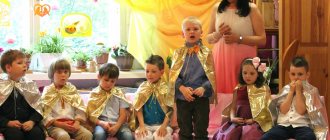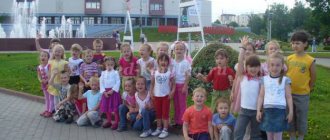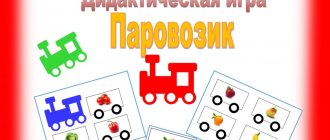Possibilities of preschool educational institutions in the cognitive development of preschool children
This article examines the relevance of the cognitive development of preschool children. The forms and methods of forming cognitive activity and cognitive interests of preschoolers are described both in the process of direct educational activities and through non-traditional forms of work.
Key words: cognitive development, preschool children, project method, experimentation, research activity, cognitive activity, cognitive interest
The cognitive development of preschool children is one of the pressing problems of preschool pedagogy. It contributes to the formation of a personality capable of self-knowledge and self-improvement.
Cognitive development is the development of all mental processes. The main indicator of the development of a preschool child is the degree to which he has mastered all kinds of children’s activities; they serve as the main driving force and source of the child’s development, and all his achievements are most clearly manifested in them [3].
The importance of the cognitive development of a preschool child is described in the Federal State Standard for Preschool Education. It involves the formation of cognitive actions, cognitive motivation, curiosity, primary ideas about the surrounding world and phenomena, and the formation of consciousness. The organization of the educational space should ensure the cognitive and research activity of all children, the opportunity to experiment with various materials. At the stage of completion of preschool education, the child must show initiative and independence in cognitive and research activities, curiosity, interest in cause-and-effect relationships, come up with explanations for occurring phenomena, have the ability to observe and experiment, and have knowledge about himself and the world around him [4].
The formation of cognitive activity in preschool children is especially important at the present stage, as it contributes to the development of curiosity, thought processes, and sustainable cognitive interests through research activities.
The works of G. M. Lyamina, A. P. Usova, E. A. Pankova note the importance of introducing preschool children to meaningful activities, during which children can independently discover the properties of objects, their similarities and differences. Meaningful activities provide them with the opportunity to gain knowledge on their own. Often the reason for the intellectual passivity of children is the limited intellectual impressions and interests of the child. Often, when children are unable to cope with the simplest learning task, they are able to quickly complete it if it is translated into a game or practical activity that is interesting for the child.
The main principle of organizing the cognitive activity of preschool children is the awareness and activity of the child himself in the process of acquiring new knowledge. The main task of the cognitive development of a preschooler is to develop in him the need to think actively and the ability to think outside the box, the ability to overcome difficulties when solving various intellectual problems.
E. A. Panko emphasizes that it is possible to form a positive attitude in a child towards knowledge by creating a comfortable communication situation between an adult and a child, as well as in a peer group, where each child is recognized as an equal participant in the pedagogical process and an active subject of activity. A child in preschool age is susceptible to how the adults around him (parents, educators) treat him; this attitude greatly influences the child’s fragile self-esteem and creates a feeling of confidence or self-doubt. Therefore, the participation, support, attention and interest of an adult in his life, affairs and problems are extremely important for preschoolers [2, p. 155].
When working with preschool children, intellectual and cognitive tasks are used, which represent all kinds of educational tasks that require the presence of knowledge, search methods and skills, as well as stimulation of the active use of connections, relationships, evidence in the process of solving assigned problems. A system of such cognitive tasks accompanies all direct educational activities, which consists of activities that are consistent and gradually more complex in content, forms and methods.
An effective method of cognitive development of preschoolers is experimentation - a practical activity of a search nature, which is aimed at learning the essence, properties, characteristics, qualities of objects and materials, connections and dependencies of phenomena. During experimentation, preschool children act as researchers who actively and independently explore the world around them, using various forms of influence and change. In the process of experimentation, a preschooler masters the position of a subject of cognitive activity [5].
Another effective method of cognitive development of preschool children is project activity, which ensures the development of children’s cognitive interests, the ability to independently form their knowledge, navigate the surrounding information space, and develop critical and innovative thinking.
In the practice of modern preschool educational organizations, the following types of project activities are used:
– research projects that require the child to have a well-thought-out structure, subordination to the logic of the research, making assumptions for solving the identified problems, developing ways to solve the assigned problems, including experimental and experimental ones; children conduct experiments, experiments, analyze the results obtained, formulate conclusions and draw up the results of the study;
– creative projects most often do not have a detailed structure of joint activity of all its participants, it is only outlined and developed, subordinate to the necessary final result, which can be designed as a video film, presentation, dramatization, holiday, exhibition, album, game, celebration;
– game projects in which the structure is also just outlined and remains open until the work is completed. During the project, children take on certain roles that are determined by the content of the project;
– information and practice-oriented projects are aimed at collecting data and information about any object, process, phenomenon; it is intended to familiarize children with this information, analyze it, summarize and systematize the facts; the result of the project is focused on the interests of the participants themselves; children collect and study information, discuss it, and present the results obtained in the form of stands, newspapers, and stained glass windows [1].
Recently, research activities have been widely used in preschool education, which involves the following:
– the child formulates a problem that needs to be resolved;
– draws up possible ways to solve this problem;
– checks possible solutions based on the data received;
– analyzes and systematizes the received data;
– draws conclusions in accordance with the results of the inspection;
– applies conclusions to new data;
– makes generalizations and formalizes the results obtained.
Using the above forms of work with preschool children when solving the problem of cognitive development of preschoolers, the teacher ensures a gradual transition, qualitative changes in the development of cognitive activity: from curiosity to cognitive activity.
In addition to the traditional forms of teaching used by teachers within the framework of direct educational activities, it is advisable to use non-traditional forms, which have recently entered the pedagogical process of preschool educational institutions. It is at such events that teachers have the opportunity not only to consolidate, clarify, expand, and systematize children’s accumulated ideas; but also introduce new content.
Forms of activities held outside of class:
– educational evenings;
– stories from teachers “Did you know...”;
– selection of illustrations, videos, presentations about animals and plants;
– growing plants with children;
– group life calendar;
– various collecting.
Thus, from what has been written above, it follows that the range of forms of organizing cognitive development that is used in preschool settings has ample opportunities in the formation of cognitive motivation, activity and interest in preschoolers.
Literature:
- Losik E.I. The role of a preschool teacher in the development of cognitive activity of older preschoolers [Text] // Theory and practice of education in the modern world: materials of the II international. scientific conf. (St. Petersburg, November 2012). - St. Petersburg: Renome, 2012. - pp. 47–49.
- Panko, E. A. Preschool teacher / E. A. Panko. - Minsk: Zorny Verasen, 2006. - 264 p.
- Popova, N.V. Pedagogical system for stimulating the cognitive activity of children of senior preschool age: abstract of thesis. diss. ...cand. ped. Sciences / N.V. Popova. - Barnaul, 2002. - 22 p.
- Federal state educational standard for preschool education, approved by Order of the Ministry of Education and Science of the Russian Federation of October 17, 2013 N 1155.
- Experimental activities of children 4–6 years old: from work experience/auth.-comp. L. N. Megnshchikova. - Volgograd: Teacher, 2009. - 130 p.




